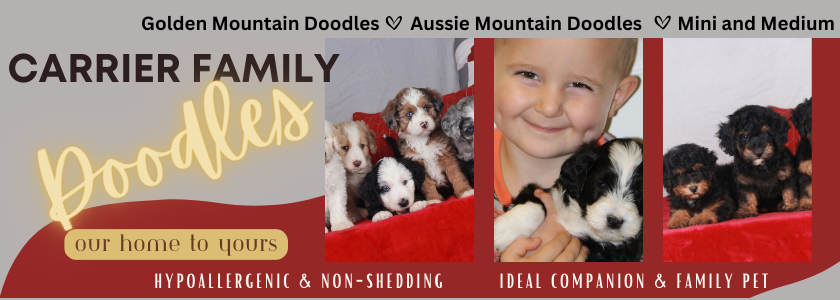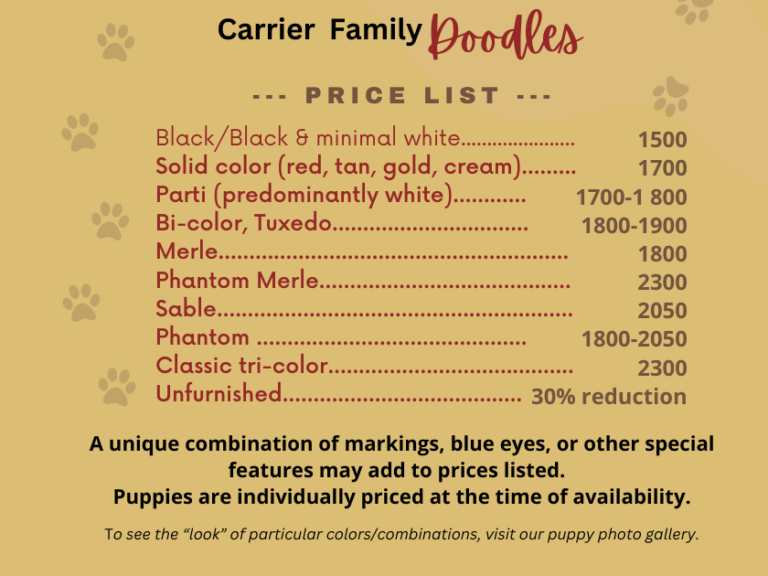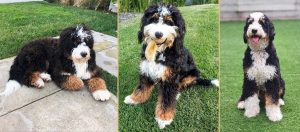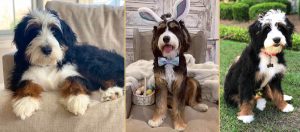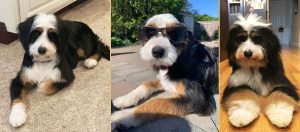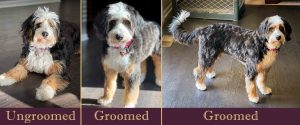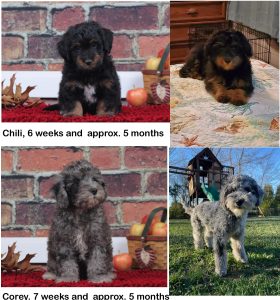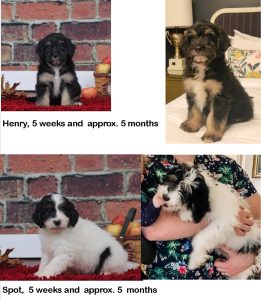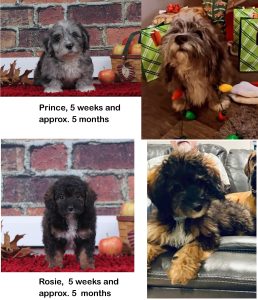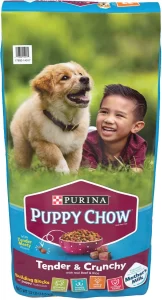
Here we tackle some of the most frequently asked questions (FAQ) about Golden Mountain Doodles and Carrier Family Doodles
Click a question below or scroll to read.
Carrier Family Doodles' FAQ
For questions not covered here (including specifics on our health guarantee, reservation process, and pick up/delivery options), please visit our policies page.
How Much do Your Puppies Cost?
How much do your puppies cost?” is one of our most frequently asked questions. Since we are regular people, too, we understand. When buying any product, you want to economize and get the best deal. On the other hand, sometimes you spend more to get a higher quality product that will meet your needs and last longer.
Although buying a puppy is different, in that it’s not a “product,” but rather a beloved addition to your family, similar considerations apply. When it comes to our puppies, we try to balance both sides of this equation carefully.
We look at the overall market and take all of the breeding variables into consideration when we price our puppies. We aren’t a “puppy mill” with lots of breeding Mamas that are treated like farm animals, living in kennels and separated from their babies as soon as possible.
Our puppies aren’t individually kenneled and neglected. We also aren’t an animal rescue, where you’re not sure what you’re getting when it comes to the health and socialization of your puppy.
Instead, we offer hypoallergenic and non-shedding breeds that are a value for those in need of them. Our puppies are well-socialized and well-cared-for, with health tested parents so that they have the best possible start.
Our puppies go home with a complete puppy gift bag, with all the starter items you will need (stainless dish, brush, collar and leash, several toys, and a quart-sized bag of food).
We put a lot of money into targeted advertising to make sure that people who buy our puppies are going to take the best possible care of them. Our level of customer service is a value-add that you won’t find with every breeder.
Another value-add is our early potty training using an asto-turf potty system. According to most of our happy customers, our puppies go home 90-95% potty trained!
We say all this because many people are not aware of the behind-the-scenes effort and cost that go into home-raising quality puppies that are healthy and well-socialized.
You can get cheaper puppies elsewhere, but if price is your primary consideration, then please do your research on the other variables that influence the price and be sure you are going to be happy with what you are getting. However, we don’t aim to take advantage of people with unreasonable prices. In the end, our puppies are neither “cheap” nor “over-the-top” compared to other breeders.
Are Your Doodles Hyppoallergenic and non-shedding?
Both Golden Mountain Doodles and Aussie Mountain Doodles ARE considered hypoallergenic and non-shedding, if the puppies are fully furnished.
However, there really is no such thing as a fully hypoallergenic and non-shedding dog. The “hypoallergenic and non-shedding” label given to Doodles comes from the Poodle in the mix. A good (simple) description of the Poodle coat (and its “non-shedding” characteristic) is here: www.allpoodleinfo.com/poodle-coat-hair.
To make a long story short, poodles have hair, not fur, and they don’t have a typical “double coat.” Instead, their hair does fall out, but it gets trapped in the coat and comes off during grooming rather than falling all over clothes, floors, and furniture.
Doodles’ hypoallergenicity comes from the fact that poodles (and poodle mixes) release much less dander, much less frequently than double-coated dogs. For those with mild to medium pet allergies, Doodles therefore make a wonderful addition to the family, as they are usually low-shed to no-shed.
For a person with severe allergies, a curly coat may be a preferred option, since a curly coat typically traps hair better. If you have concerns, we suggest that you get allergy testing done and/or take some time to interact with doodles and their humans in your area before purchasing a puppy. Also, be aware that people can also be allergic to dog saliva or urine, etc.
Read below about the difference between “furnished” and “unfurnished” Doodles, which has a big impact on whether or not a puppy is going to be considered hypoallergenic and non-shedding.
What's the difference between "Furnished" and "Unfurnished?
What is known as a “Furnished” Doodle is best recognized by its brows and bearded look (and it is usually considered non-shedding and hypo-allergenic), whereas an “Unfurnished” Doodle will typically have straighter/shorter facial fur and a flat muzzle. (and is NOT considered non-shedding and hypo-allergenic). A furnished Doodle also has a noticeable “top-knot” on the head, fur growing around/over the eyes, and fur over the claws. These are noticeably absent on an unfurnished dog.
An unfurnished Doodle is often referred to as a “flat coat” or an “improper coat” and although it is usually NOT a fully non-shedding dog, shedding will likely be considerably less than parent breeds (the golden retriever, Australian shepherd, or Bernese mountain dog). For this reason, many who like the flat-muzzle look of the parent breeds opt for an unfurnished Doodle. The grooming requirements are much less intensive than their furnished counterparts.
The “unfurnished” occurs in a small percentage of our Golden Mountain Doodle and Aussie Mountain Doodle puppies because of the genetics of our puppy parents. Our F1b Mamas are expected to have all “furnished” puppies (one or two with “weak” furnishings), while we have 1-2 unfurnished puppies in each litter for our F1 Mamas.
Unfurnished puppies can be identified via a genetic test, or may be visually assessed at approximately 5 weeks of age. (For more information on furnished vs. unfurnished, visit GoldenMountainDoodles.info.)
Due to the genetics of our puppy parents, we also have an occasional puppy that is “weakly furnished.” They have initial signs of furnishings, but do develop more slowly and probably won’t get a full “beard” until the adult coat comes in. They can be considered hypoallergenic and low-to-non-shedding, but if you have severe allergies, you will probably want to err on the side of caution and choose a fully furnished, curlier Doodle.
Be aware that the gene for coat type (straight, wavy, or curly) is entirely separate from the gene for furnishings. Thus, it is possible to have a straight-coated, furnished Doodle OR a curly-coated, unfurnished Doodle.
The puppy coat differs from the adult coat, and a straighter-coated puppy will typically end up with coarser, wavier fur when the adult coat comes in. A wavy puppy may and up “almost” curly as an adult. However, the furnishings do not change.
If you are uncertain about a potential allergic response to one of our puppies, it is best to visit our parents and puppies before making a decision. Alternatively, try to find a local Doodle among neighbors, friends, or family to do a “test run.” We have not had any known allergic reactions to our furnished puppies, except one that was due to puppy saliva (not hair or dander, which are the more common allergens).
What are our Golden Mountain Doodle and Aussie Mountain Doodle Coat Types?
Each of our Doodles is different, depending on the genetics of the parents and how they have been bred. Coats fall into three main categories: Curly, Wavy, and Straight.
The appearance of our dogs is greatly affected by how short the coats are and how recently they have been groomed. Be sure to consider this when looking at the pictures. Also note that a straight coat is not an indication of an unfurnished dog and does not necessarily mean that the dog will shed more.
CURLY COAT
The curly coat will shed the least and is the most hypoallergenic of the three types. The curls on this coat are usually tight with a soft texture much like what you would see on a Poodle. Curly coats should be brushed daily and trimmed frequently. The curly coated Doodle is usually the most suitable for owners who have an allergy to dog dander. They are also the most high-maintenance, as it is important to prevent matting.STRAIGHT COAT
The straight coats don’t necessarily shed more than other coat types, and a straight coat on a furnished dog is still considered hypoallergenic. Even though this coat is called “straight,” it may actually have a slight wave to it. The length of the dog’s straight hair depends mostly on the length of the parent’s hair.
Whether furnished or unfurnished, every puppy will have a certain coat type (straight, wavy, or curly). The appearance of your dog will depend not only on its coat type, but how (and how frequently) you have it groomed.
Grooming: Getting the Appearance You Want for Your Doodle
Keep in mind, if you select a potential parent for your ideal puppy, the adult dog’s appearance is greatly affected by how they are groomed. The pictures here are given as examples of the same dog, in groomed versus ungroomed conditions. Each of our dogs is treated differently, depending on coat type, dog personality, personal preference, and even weather.
Likewise, once your puppy comes home, you will need to decide how often you want to have him/her groomed, and to what extent.
Our Doodles require regular brushing (2-3 times per week, perhaps daily for curlier coats) with a specialized dog brush to keep them free from matting. (Visit our Recommended Products page to see what we use for our dogs.) From the time they are puppies, it is a good idea to brush your dog every day to get them used to regular grooming. If you choose to clip your dog’s hair, this can be done every 8-12 weeks or according to your preference and the dog’s activity level and needs.
Even if you like to keep your dog “floofy,” furnished Doodles will typically benefit from a “hygienic trim” between grooming appointments to keep face, paws, and backside clean. You can easily learn to do this yourself to keep professional grooming visits (and costs) to a minimum.
A curly-coated dog requires consistent brushing and more frequent, professional grooming; once matted, they may need to be shaved to prevent further issues.
What will my Puppy Look Like as an Adult Dog?
One of the first things you may notice is that all our puppies are born with pink noses. They become black within the first 8 weeks or so, although there is the occasional dog that never gets a fully black nose. The pink noses may be obvious in first photos, but they will normalize with time.
The final size of your puppy will depend on the size of its parents. Most of our puppy parents are Mini in size, but we occasionally breed our larger minis with Buster (50 lbs) to produce a “medium” sized puppy.
Our “mini” puppies typically stand 14-17″ at the shoulder and weigh 20-30 lbs as adults. Our “medium” puppies typically stand 17-21″ at the shoulder and weigh 30-45 lbs. Of course, there is a possibility for “outliers” in the weight range, since there are large breed dogs in the genetic pool. However, we keep very thorough puppy weight records and can estimate fairly well what the adult weight will be for our puppies.
Your puppy will have a certain coat type (straight, wavy, or curly). Between 6 and 12 months, the “puppy coat” naturally changes. It usually becomes coarser, and if it had been straight it may become wavy. A wavy puppy coat oftentimes becomes curlier. A puppy that had not really required any grooming prior to the coat change may suddenly need regular, aggressive brushing with a different style comb or brush to prevent matting. If you have not been regularly brushing your puppy prior to this point, they are now of a size and disposition when they may actively resist grooming.
It is important to know about, and anticipate, the changes that will occur when the puppy coat is shed. If your dog is fully furnished, any minor shedding you may notice should normalize once the adult coat is fully in.
Coats sometimes change in color, with reds or browns fading or black coats becoming slightly silvered. (Interestingly, however, Buster’s “golden puppies” tend to get darker and may end up ginger or red, rather than fading.) Some parti puppies (predominantly white) may and up with some additional freckling when the adult coat comes in, or it may be more obvious if
they are clipped short. Sable puppies will also vary in appearance depending on how closely you clip the fur, since it is the color at the the ends of the hair that give sables their unique appearance.
Below are a few photos comparing puppy with older dog photos.
We love getting updates about our puppies after they’ve settled into their forever homes, and beyond! We do have some photos of our puppies at older ages, such as the sampling above (each one, approx. 5-6 weeks, and approx. 5 months). We do have some at one-year-plus. Feel free to contact us if you are interested in seeing more grown up photos of previous puppies.
how does the Puppy Selection Process Work?
If you are interested in purchasing a Golden Mountain Doodle or Aussie Mountain Doodle, we invite you to sign up for notifications of new litters here.
As of December 2023, we now maintain a wait list for our puppies. The wait list fee is $100. Once you are on the wait list for your “preferred puppy,” we will notify you when matching puppies arrive. You will have 7-10 days before selection day to request photos, videos, and additional information or to schedule a video chat or visit. We progress through the wait list by numbered participant (based on date of sign up), with each participant having 24 hours to select their puppy or “pass” and wait on a future litter. (Find out more about our wait list.)
We open each litter for public reservation once the wait list has been processed and puppies selected. Any remaining puppies may be reserved on a first come, first served basis.
We usually open new litters for reservation/deposit at approximately 4-5 weeks, when furnishings can be determined with some confidence and when puppy appearance and personality are better developed.
For our F1b Mamas (which have, thus far, had all-furnished litters), we may open reservations earlier, but until 4-5 weeks not much will be known about temperament. Of course, because our puppies are home-raised and well-socialized, and because the breed is generally people-loving and eager-to-please, you can be assured that your puppy will be friendly and sociable. What may not be known right away is the level of energy (active or playful) and the level of confidence or shyness of a puppy.
You can make an appointment to come see the puppies in person before putting down a deposit. Alternatively, we enjoy answering your questions and providing photos and/or videos via email, text, WhatsApp, or FB Messenger. We can arrange real-time video calls via WhatsApp, Messenger, or Google Meet. (Sorry, Face Time is not an option.)
What Should I Feed my Puppy?
Our puppies’ first food is usually Black Gold Explorer, since that is Mama’s food after whelping and the puppies typically begin munching on it while they are still nursing. However, by the time they are near weaning, they are usually exclusively eating Purina Puppy Chow (Beef & Rice).
We chose this because it is a quality food that will be accessible to most people who go home with one of our puppies. Every puppy leaves us with a quart-sized starter bag of our puppy food.
If you want to use another brand of food, you can use the starter bag to mix slowly with your preferred food until your puppy has transitioned completely.
Our puppies are on “auto feed” and can eat as much as they would like, as often as they like. However, when you welcome a Carrier Family Doodles puppy into your home, you will probably want to feed them 3 times per day, an average of 1 cup of food per feeding; adjust if your puppy eats less, and offer more if they eat quickly and still seem hungry. Our minis tend to eat 1/2-3/4 cup and our medium, closer to 1 cup per feeding.
Will my Puppy Receive Vaccinations and De-Worming before I Bring Him Home?
Our puppies are typically de-wormed 3 times before they go home (e.g. at 3, 5, and 7 weeks) and have their first set of vaccinations (Parvo at 4 weeks and “5-way” at 6 weeks).
Our puppies also receive a preventative parasite-control treatment between 7-8 weeks or before going to their “forever home.” This is to make sure they have not acquired common puppy parasites like giardia or coccidia. We do test for these and tests are typically clear, but because these parasites are easily transmitted and infections can spread quickly among litters of, we have chosen to do a “preventative treatment” for all our puppies before they leave our care.
If you do not reserve a puppy before 8 weeks of age or if there is not enough time for us to administer the treatment before the puppy leaves us, we may send the puppy home with the treatment and instructions for administration, to ensure the health of your puppy.
A 5-way booster will need to be done when the puppy is around 10-12 weeks weeks of age. If your puppy comes home at 8 weeks, we recommend you see a vet for an initial checkup and have them decide when the follow-up vaccines should be done. It is important to keep your puppy on schedule for their vaccinations. We include a Health Record in the paperwork so your vet can see the shots we gave your puppy.
If your puppy reaches 10-12 weeks before “go-home day,” we can administer the additional booster, at a nominal cost.
Each of our puppies receives a final vet-check at approximately 7 weeks, to check for any problems before puppy goes home.
What Will I get when I get a Carrier Family Doodle?
Your puppy comes home with a gift bag full of everything you need: stainless steel dog dish, play and chew toys, brush, collar and leash, starter bag of dog food, and puppy-print fleece blanket.
Your puppy is already ICA registered. This is a national tracking database that can help reunite you with your puppy if they are lost or stolen and their microchip is scanned at a vet or shelter. This ICA registration will automatically be transferred to you via email shortly after you pick up your puppy.
Our puppies up-to-date on de-worming and vaccinations, vet-checked at 7 weeks, and receive parasite control treatments (for giardia or coccidia). They are health guaranteed for their first 60 days to cover any unexpected issues that may arise upon your first official vet visit (expected to take place within 72 hours of purchase).
As well, we offer a 2-year genetic health guarantee. For more on our health guarantee, please visit our policies page.
Our puppies are home-raised and well-socialized, and we typically put our litters of puppies through their paces with Early Neurological Stimulation (ENS) as well, so they have every advantage we can offer to give them the best possible start!
Where is Carrier Family Doodles Located, and How can I get my Puppy Home?
Carrier Family Doodles is located in New Concord, KY. You are welcome to visit us any time; just give us a call at 765.318.1123 to arrange a day and time.
You can visit when it’s time for you to select a puppy, or you can choose your puppy via video/video call and correspondence, and pick up at our location on your designated adoption day. We can also arrange delivery for you if pickup is inconvenient. Some opt to fly with their puppy. (Please see our policies page for options and fees.)
Our puppy customers come from all over the United States! We are centrally located in the US and have flexible delivery options and rates to help make our puppies accessible to more people.
How does the Carrier Family Doodles Puppy Giveaway Work?
We know many people who would love a Golden Mountain Doodle for a special purpose: as an emotional support animal for an elderly loved one or a special needs child, or to provide an anchor for a family in transition. Yet not everyone can afford it.
We are Christians who believe in giving back from what God has blessed us with. For this reason, we offer one free “giveaway puppy ” out of every 10 that are born. This giveaway does come with certain terms and conditions, so if you are interested, please visit our giveaway page!
What about Puppy Potty Training?
Because Carrier Family Doodles’ puppies are home-raised, we are just as concerned about puppy potty training as you are! This is a detailed topic, so we devoted a whole page to the subject of potty training.
